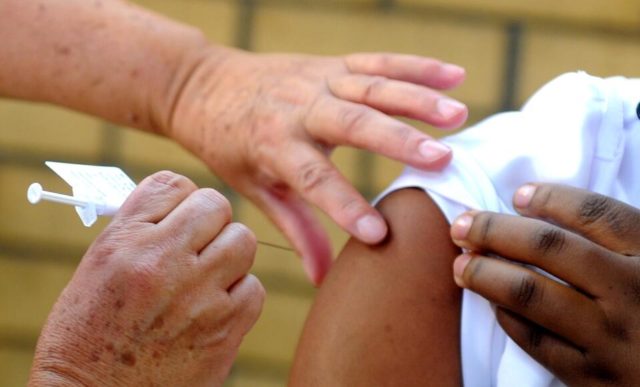Already several countries in Africa and the Middle East have taken delivery of vaccines from the Covax Facility
SOUTH Africa is expecting its consignment of Covax-acquired vaccines in the coming weeks.
Spokesperson at the Department of Health, Dr Lwazi Manzi, said the Covax delivery is likely to take place in the second quarter.
On Tuesday, Reuters reported that the Covax vaccine-sharing scheme will set aside 5% of the vaccine doses it procures for a “buffer” to be used in humanitarian settings or released in the case of severe outbreaks.
The Covax facility, backed by the World Health Organization and the Global Alliance for Vaccines and Immunisation, hopes to secure two billion vaccines for lower income countries.
Covax, earlier this month, announced that its target was to deliver 237 million doses of AstraZeneca to 142 countries by the end of May and also shipped its first Pfizer vaccines.
Already several countries in Africa and the Middle East have taken delivery of their vaccines. In Europe, Covax has delivered vaccines to Moldova, Albania and Georgia.
Several countries across Asia and the Americas have also received their doses.
Gavi, The Vaccine Alliance, noted that while national governments were ultimately responsible for providing access to Covid-19 vaccines for all high-risk groups within their respective territory, the Covax Buffer will be available for use where there are unavoidable gaps in coverage, for example in instances of state failure and conflict, and in areas controlled by non-state armed groups inaccessible to governments.
The Inter-Agency Standing Committee (IASC) – a forum of UN and non-UN organisations working to improve the delivery of humanitarian assistance to affected populations – estimates that 167 million people are at risk of exclusion from Covid-19 vaccination.
Over two-thirds are in economies eligible for support through the Gavi Covax Advance Market Commitment (AMC), many in non-government-controlled areas and therefore out of reach of national vaccination campaigns.
“Equitable access is the foundational goal of Covax, and the available doses should be distributed in accordance with humanitarian principles and upholding governments’ obligations towards populations within their territory,” said José Manuel Barroso, who led his first meeting as a Chair of the Gavi Board.
“However, we cannot stop there. While the first resort in covering all high-risk groups, irrespective of their legal status, is including them in national vaccination plans, the Covax Buffer will serve as a safety net to ensure these populations do not get left behind.”
Covax Buffer will also provide a contingency for severe outbreaks of Covid-19 by enabling emergency release of doses where regular vaccine allocation timelines may not be sufficient.
This surge of doses, aimed at addressing acute outbreaks, is only going to be considered once all Covax Facility participants have been allocated a base amount of vaccine doses. All Covax Facility participants, both self-financing and AMC-eligible economies, as well as national and international humanitarian agencies, will have access to doses through the Covax Buffer.
“As we have started the roll-out of millions of doses of Covid-19 vaccines to Covax economies, it is essential to also protect high-risk groups caught in crisis settings,” said Dr Seth Berkley, CEO of Gavi, the Vaccine Alliance.
“This means not forgetting the millions of people in conflict-affected settings or in settings that are not under the control of national governments, for it is in these last mile communities where the need for equity is most pronounced.”
The Covax Buffer will be funded through the Gavi Covax AMC for humanitarian situations in AMC-eligible economies as well as on a case-by-case basis in self-financing economies aiming to cover populations originating from AMC-eligible economies. Self-financing participants will also be able to access the Buffer doses, which will be self-funded.
In addition, 5% of the $150 million (about R2.214 billion) delivery support approved by the Gavi Board in December 2020 will be made available for exceptional delivery assistance.
Gavi supports high-risk populations in humanitarian settings with routine immunisation and outbreak response programmes through its Fragility, Emergencies, Refugees (FER) policy and four emergency vaccine stockpiles – for Ebola, cholera, meningococcal and yellow fever vaccines.
Stockpiles are an essential and effective mechanism to enable rapid and equitable access to vaccines and the FER policy facilitates access to vaccines for populations in humanitarian contexts that are otherwise at risk of being left behind.
The design of the Covax Buffer has drawn on the principles of flexibility and exceptionality of these approaches as well as lessons learnt from the investment in stockpiles and FER policy implementation.
The Board has also noted the successful start of vaccine roll-out to Covax participants with over 31 million doses delivered to 57 economies to date.








